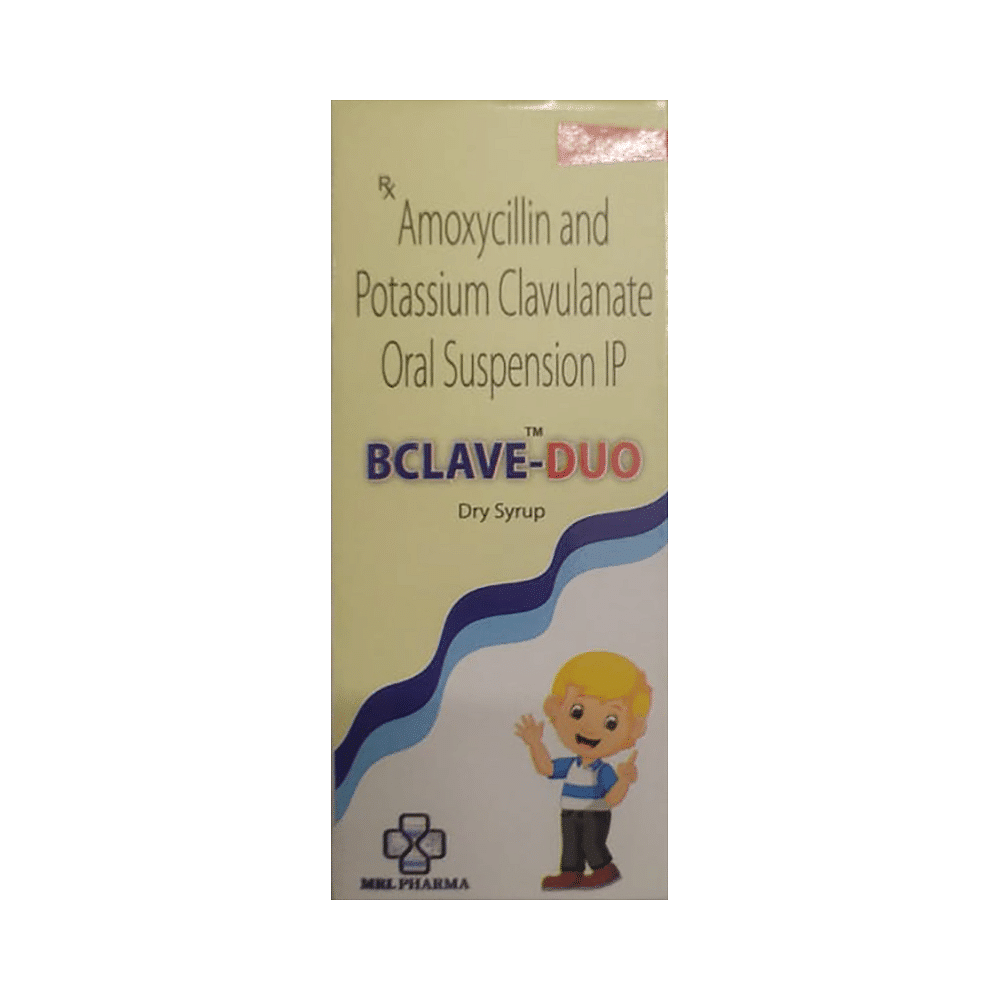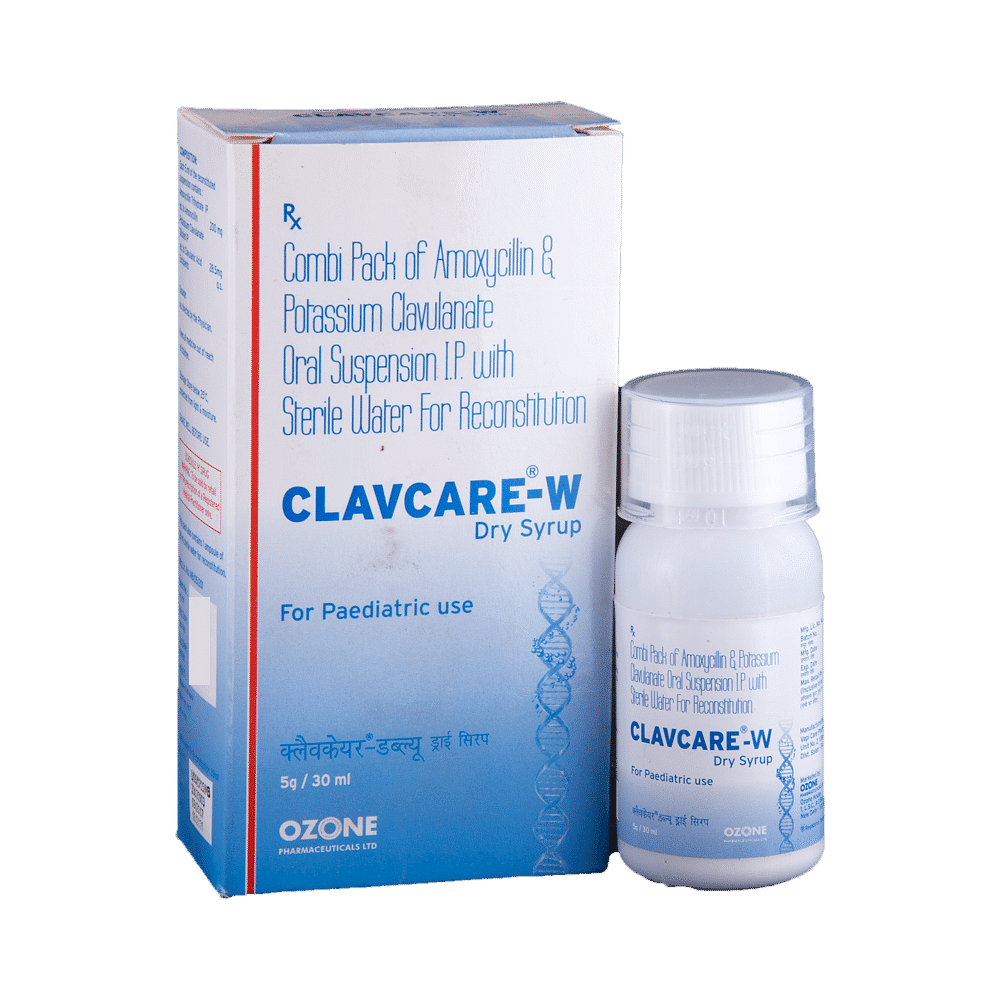
Calvoz Dry Syrup
Manufacturer
Ozenius Pharmaceuticals
Salt Composition
Amoxycillin (200mg/5ml) + Clavulanic Acid (28.5mg/5ml)
Key Information
Short Description
Calvoz Dry Syrup is an antibiotic medicine that helps treat bacterial infections of the ear, nose, throat, chest, lungs, teeth, skin, and urinary tract.
Dosage Form
Oral Suspension
Introduction
Calvoz Dry Syrup is an antibiotic medicine that helps treat bacterial infections of the ear, nose, throat, chest, lungs, teeth, skin, and urinary tract. It is capable of killing bacteria that have become resistant to other therapies and thus also helps treat tuberculosis that is resistant to other treatments.
Directions for Use
Your child must complete the entire course of antibiotics. Stopping too soon may cause the bacteria to multiply again or cause another infection.
Safety Information
Side Effects
No common side effects listed
How it works
Calvoz Dry Syrup is an antibiotic. It has two active agents amoxycillin and clavulanic acid. Amoxycillin works by preventing the formation of the bacterial protective covering (cell wall) essential for the survival of the bacteria. Whereas clavulanic acid serves a special purpose of inhibiting an enzyme (beta-lactamase) that is produced by resistant bacteria. This makes the combination of amoxycillin and clavulanic acid an effective line of treatment for many types of infections.
Quick Tips
Your child must complete the entire course of antibiotics. Stopping too soon may cause the bacteria to multiply again or cause another infection. Your child may have a bitter taste in the mouth after the intake of Calvoz Dry Syrup. Eating citrus fruit or sipping plenty of water or fruit juice may help. Encourage your child to drink plenty of water in case diarrhea develops as a side effect. Never give Calvoz Dry Syrup until and unless prescribed by the doctor. Do not give Calvoz Dry Syrup to treat common cold and flu-like symptoms caused by viruses. Never save medicine for future illnesses. Check ‘expiry’ before giving Calvoz Dry Syrup to your child. Immediately discard all the expired medicines. Stop Calvoz Dry Syrup immediately if your child develops an itchy rash, facial swelling, or breathing difficulty. Report to the doctor without any delay.
Related Medicines

Origam-CV Oral Suspension

Bclave-Duo Dry Syrup

Oxicil-CV Plus Dry Syrup

Amonit Plus Dry Syrup

Afclav Dry Syrup

D-Clav Dry Syrup

Axclav Dry Syrup

Eviclav Dry Syrup

Gevoxtin Oral Suspension

Clavcare-W Dry Syrup
Frequently asked questions
Can other medicines be taken at the same time as Calvoz Dry Syrup?
It's important to inform your doctor about any other medications or supplements your child is taking before starting Calvoz Dry Syrup. Consulting with your child’s doctor before administering any medicine is crucial, especially during long-term treatments.
Can I get my child vaccinated while on treatment with Calvoz Dry Syrup?
Generally, antibiotics do not significantly interfere with vaccine ingredients or cause negative reactions in children who have recently received a vaccination. However, it's recommended to hold off on vaccinations until the child recovers from any illness they may be experiencing, especially after an infection. Once your child is feeling better, they can receive the vaccine.
Which lab tests might my child undergo while taking Calvoz Dry Syrup long-term?
Periodically, a doctor may order kidney and liver function tests during extended antibiotic treatment to assess your child's condition.
Can I give a higher than the recommended dose of Calvoz Dry Syrup to my child?
No, exceeding the recommended dosage of this medication may amplify side effects. If your child experiences increased symptom severity, please consult their doctor for re-evaluation.
Can I stop giving Calvoz Dry Syrup to my child when symptoms are relieved?
No, do not discontinue this medication unless the full course of treatment is completed. Even if you notice symptom improvement, the infection may not be fully cleared yet. Continue with the prescribed dosage for its duration and consider continued use to ensure potential benefits.
Can Calvoz Dry Syrup cause diarrhea in children?
Yes, Calvoz Dry Syrup can contribute to diarrhea. It's important to understand that this medication is an antibiotic designed to kill harmful bacteria. Additionally, the medication might affect the beneficial bacteria present in your child’s stomach, leading to diarrhea. Encourage your child to drink plenty of fluids if they experience diarrhea. If symptoms persist or you notice signs of dehydration, such as reduced urination and dark-colored, strong-smelling urine, consult your doctor. Never administer any medicine without consulting your doctor first.
Do all viral common colds require a secondary bacterial infection?
In most instances, bacterial infections do not follow viral infections. In fact, administering antibiotics in viral infections can potentially increase the risk of side effects for the child. It's crucial to use antibiotics only after consulting your child’s doctor.
What should I know about the color of my child’s nasal mucus?
Yellow or green nasal mucus during a common cold is not an indication that antibiotics are required. It's normal for mucus to thicken and change color as it does so, often lasting 7-10 days. During this time, the mucus may become more yellow or green.
Are there any signs indicating immediate medical attention is needed?
Contact your child’s doctor immediately if your child experiences severe allergic reactions (difficulty breathing, skin rashes), gastrointestinal complications (diarrhea), or liver damage (weakness, paleness, vomiting). Though rare, these symptoms are serious and require professional assistance.


